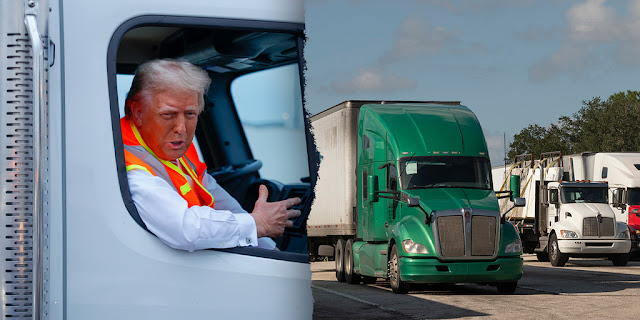President Donald Trump on Monday signed an executive order mandating that all commercial truck drivers operating within the United States demonstrate proficiency in English, citing public safety, national communication standards, and the operational demands of the trucking industry.
The order underscores the vital role truck drivers play in the American economy, transporting goods across state lines and ensuring supply chains remain functional. “Every day, truckers perform the demanding and dangerous work of transporting the Nation’s goods to businesses, customers, and communities safely, reliably, and efficiently,” the order states.
The latest action builds on an earlier executive order issued by Trump in March that formally designated English as the official language of the United States. Monday’s order extends that policy to the commercial transportation sector, where language barriers, the administration argues, can pose significant safety risks.
A Matter of Safety and Function
In the executive order, Trump emphasized that English proficiency is not a matter of preference but of necessity. “They should be able to read and understand traffic signs, communicate with traffic safety, border patrol, agricultural checkpoints, and cargo weight-limit station officers,” the order reads. “Drivers need to provide feedback to their employers and customers and receive related directions in English.”
The order outlines that all commercial drivers must be able to “read and speak English sufficiently to converse with the general public” as a condition for operating a commercial motor vehicle in the U.S.
“This is common sense,” Trump said in a brief statement, reinforcing that clear communication on the road is crucial for preventing accidents and ensuring effective law enforcement interaction.
Enforcement and Implementation
Transportation Secretary Sean Duffy has been tasked with issuing new guidance for English proficiency testing and outlining enforcement mechanisms. Under the order, drivers who fail to meet the language requirement will be placed “out-of-service” until they demonstrate compliance.
White House Press Secretary Karoline Leavitt pointed to real-world communication issues on the road as justification for the policy. “You might not know, but there’s a lot of communication problems between truckers on the road with federal officials and local officials, as well, which obviously is a public safety risk,” she said during a Monday briefing.
Industry Reactions
The executive order was met with praise from some corners of the trucking industry, particularly the Owner-Operator Independent Drivers Association (OOIDA), which represents over 150,000 truckers.
“OOIDA and the 150,000 truckers we proudly represent strongly support President Trump’s decision to resume enforcement of English proficiency requirements for commercial drivers,” said OOIDA President Todd Spencer. “Basic English skills are essential for reading critical road signs, understanding emergency instructions, and interacting with law enforcement.”
However, the new policy could also have implications for immigrant drivers who are proficient in their native languages but may not meet the English standard. Critics of the order are expected to raise concerns about potential labor shortages and the fairness of retroactively enforcing language requirements on existing drivers.




















